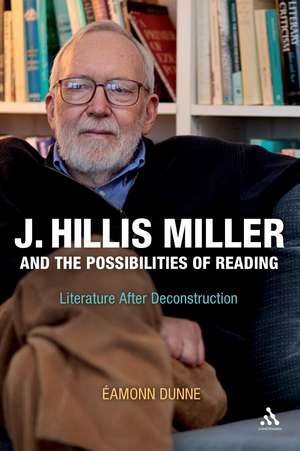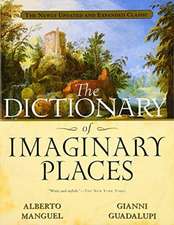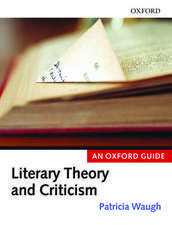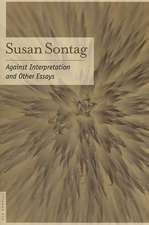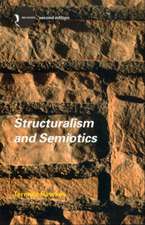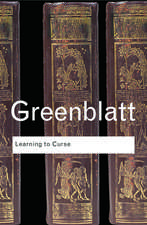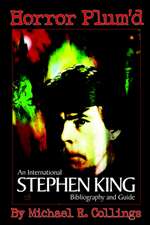J. Hillis Miller and the Possibilities of Reading: Literature After Deconstruction
Autor Dr Eamonn Dunneen Limba Engleză Paperback – 25 apr 2012
Surprisingly, Eamonn Dunne's J. Hillis Miller and the Possibilities of Reading is the first book devoted exclusively to examining Miller's work. Dunne argues that an appreciation of Miller is crucial to an informed understanding about the radical changes occurring in critical thinking in the humanities in recent years. This book, the first of its kind, will be a vital and enabling avenue for further research into J. Hillis Miller's exemplary and prolific output.
| Toate formatele și edițiile | Preț | Express |
|---|---|---|
| Paperback (1) | 255.38 lei 6-8 săpt. | |
| Bloomsbury Publishing – 25 apr 2012 | 255.38 lei 6-8 săpt. | |
| Hardback (1) | 773.39 lei 6-8 săpt. | |
| Bloomsbury Publishing – 7 iul 2010 | 773.39 lei 6-8 săpt. |
Preț: 255.38 lei
Preț vechi: 330.08 lei
-23% Nou
Puncte Express: 383
Preț estimativ în valută:
48.87€ • 50.41$ • 40.78£
48.87€ • 50.41$ • 40.78£
Carte tipărită la comandă
Livrare economică 26 martie-09 aprilie
Preluare comenzi: 021 569.72.76
Specificații
ISBN-13: 9781441136398
ISBN-10: 1441136398
Pagini: 176
Dimensiuni: 156 x 234 x 10 mm
Greutate: 0.26 kg
Editura: Bloomsbury Publishing
Colecția Continuum
Locul publicării:New York, United States
ISBN-10: 1441136398
Pagini: 176
Dimensiuni: 156 x 234 x 10 mm
Greutate: 0.26 kg
Editura: Bloomsbury Publishing
Colecția Continuum
Locul publicării:New York, United States
Caracteristici
Examines issues in literary theory such as narrative theory, ethical criticism, speech act theory, deconstruction, and Derrida.
Notă biografică
Dr Eamonn Dunne (PhD, University College Dublin) teaches English at Coláiste Chraobh Abhann school in the Republic of Ireland and is an External Marker for the National University of Ireland, Mayrooth. His research areas include speech act theory, narratology, contemporary continental philosophy, and twentieth-century movements in literary theory and criticism. He has had articles and reviews published in Textual Practice and Derrida Today.
Cuprins
Introduction
1. Reading as Conduct
2. Fugal Reading
3. Double Reading
4. Protocols of Reading
5. Reading Parable
6. Just Reading
Conclusion
Coda: Interview: "For the Reader to Come"
Bibliography
1. Reading as Conduct
2. Fugal Reading
3. Double Reading
4. Protocols of Reading
5. Reading Parable
6. Just Reading
Conclusion
Coda: Interview: "For the Reader to Come"
Bibliography
Recenzii
"J. Hillis Miller is very likely the most happily influential critic of the last fifty years, issuing provocative book after book and conducting his prodigious education generously right before our eyes. Eamonn Dunne's study is a wonderfully responsive, careful but by no means reverential discussion of some of Hillis' leading preoccupations and their lasting implications. The book is especially useful in its analysis of the ethics of reading, of various shades of irony, and, most generally, of what happens when we read and write about what we love." -- James R. Kincaid, Aerol Arnold Professor of English, University of Southern California, USA.
"Sustained studies of J. Hillis Miller's pivotal role in the innovation and dissemination of critical theory over the past half-century are long overdue. Miller has been a polymath and decisive contributor to the field: as an early bellwether to European phenomenology and the criticism it inspired; as an exemplary collaborator and catalyst to the critical styles and interventions of Paul de Man and Jacques Derrida. But most importantly, as an inexhaustible and thoroughly innovative critic in his own right, whose readings of key literary and philosophical texts bristle with authenticity to their specific contexts and ethical inevitability. Miller is an equal partner in the exemplary intellectual exchanges he sustained with de Man and Derrida in such openness and generosity. His work, in its protean reformatting and relentless self-reconfiguration, is reminiscent, above all, of the sustained mindfulness Maurice Blanchot directed toward twentieth-century letters. Eamonn Dunne's J. Hillis Miller and the Possibilities of Reading fully rises to its own formidable critical occasion. It is far less a recapitulation of the stations along Miller's way than a stunning constellation of major critical improvisations that Miller made with such regularity--among them his commanding understanding of speech-acts and performatives, his fractal reading of Proust, and his uncanny mobilizations of misreading, telepathy, and cryptonymy--that without Dunne's active complicity we might lose sight of them. "Dunne amply evidences Millerian virtuosity as a reader in the muscular compression with which he reconstitutes and arrays a sequence of stunning innovations that Miller contributed under battle conditions of the critical wars. In so doing, he furnishes a striking and enduring transcript of what goes right when critical penetration and devotion find inspiring philosophical paradigms, auratic cultural artifacts, and a cadre of brilliant co-equals in the collective programming of critical rigor."-- Henry Sussman, Visiting Professor of Germanic Languages and Literatures, Yale University, USA
"Sustained studies of J. Hillis Miller's pivotal role in the innovation and dissemination of critical theory over the past half-century are long overdue. Miller has been a polymath and decisive contributor to the field: as an early bellwether to European phenomenology and the criticism it inspired; as an exemplary collaborator and catalyst to the critical styles and interventions of Paul de Man and Jacques Derrida. But most importantly, as an inexhaustible and thoroughly innovative critic in his own right, whose readings of key literary and philosophical texts bristle with authenticity to their specific contexts and ethical inevitability. Miller is an equal partner in the exemplary intellectual exchanges he sustained with de Man and Derrida in such openness and generosity. His work, in its protean reformatting and relentless self-reconfiguration, is reminiscent, above all, of the sustained mindfulness Maurice Blanchot directed toward twentieth-century letters. Eamonn Dunne's J. Hillis Miller and the Possibilities of Reading fully rises to its own formidable critical occasion. It is far less a recapitulation of the stations along Miller's way than a stunning constellation of major critical improvisations that Miller made with such regularity--among them his commanding understanding of speech-acts and performatives, his fractal reading of Proust, and his uncanny mobilizations of misreading, telepathy, and cryptonymy--that without Dunne's active complicity we might lose sight of them. "Dunne amply evidences Millerian virtuosity as a reader in the muscular compression with which he reconstitutes and arrays a sequence of stunning innovations that Miller contributed under battle conditions of the critical wars. In so doing, he furnishes a striking and enduring transcript of what goes right when critical penetration and devotion find inspiring philosophical paradigms, auratic cultural artifacts, and a cadre of brilliant co-equals in the collective programming of critical rigor."-- Henry Sussman, Visiting Professor of Germanic Languages and Literatures, Yale University, USA
